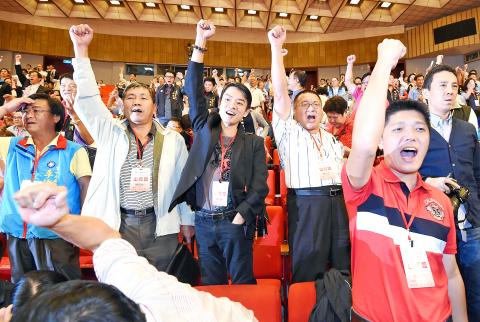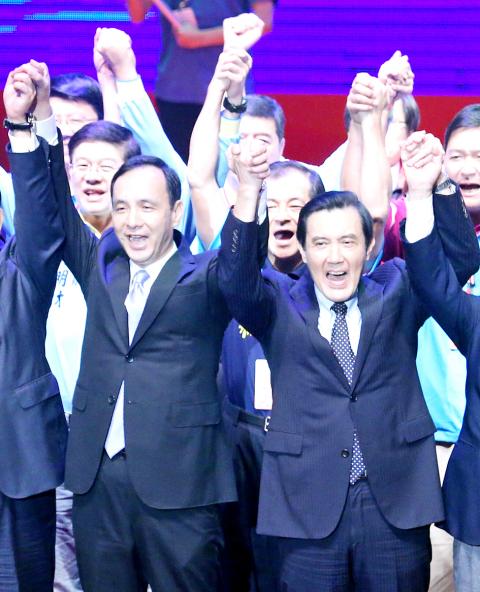Chinese Nationalist Party (KMT) Chairman Eric Chu (朱立倫) yesterday apologized to New Taipei City residents for breaking his promise to serve out his term as the municipality’s mayor after being endorsed by a KMT extempore congress to replace Deputy Legislative Speaker Hung Hsiu-chu (洪秀柱) as the party’s presidential candidate.
Following a landslide vote to rescind Hung’s candidacy, a majority of the 891 KMT representatives at the congress approved Chu’s nomination by standing up and applauding.
The congress authorized Chu to recommend a possible vice presidential candidate, whose nomination is then to be assessed by the party’s seven-person presidential nomination evaluation panel headed by KMT Vice Chairman Hau Lung-bin (郝龍斌).

Photo: CNA
Against the backdrop of party representatives chanting: “Eric Chu, winning the election” and “Go KMT,” Chu said it was with a solemn and heavy heart that he shouldered the expectations the public had for the party.
“Starting today [yesterday], we will adjust our pace and start afresh,” Chu said. “This critical moment might go down in history as a day of polarization for the KMT, but it could also be a time of solidarity.”
Chu said the reason he dared to accept the challenge in the KMT’s darkest hour was the same reason that prompted him to enter politics 17 years ago: to ensure a better world for future generations.

Photo: CNA
Chu said he had been reluctant to consider joining the Jan. 16 race because of the pledge he made to New Taipei City residents when he announced he would run for re-election as mayor in June last year and vowed to serve out a second term.
“Nevertheless, to safeguard the KMT’s reins of government and majority in the legislature, as well as the future of the public and the Republic of China [ROC] ... I must apologize to each New Taipei City resident who supports me,” Chu said.
“I want to tell every Taiwanese and resident of the city that I am doing this because I have to protect the ROC we love, the democratic politics we have fought to preserve and our healthy democracy of checks and balances,” he said.
Should the KMT become a minority party in the legislature or gain less than one-third of the legislative seats in the Jan. 16 elections — to be held alongside the presidential vote — no one can imagine what the Democratic Progressive Party (DPP) might do, Chu said.
Chu said that if the KMT fails to maintain its legislative majority, the nation’s future, as well as cross-strait peace could be jeopardized.
Challenging DPP presidential candidate Tsai Ing-wen (蔡英文) to a debate on cross-strait policies, Chu said Tsai should define the “status quo” she intended to maintain.
“Does her ‘status quo’ refer to the situation maintained by the KMT based on the [so-called] ‘1992 consensus’ or the one championed by President Ma Ying-jeou (馬英九) in accordance with his ‘three noes’ policy — no unification, no independence and no use of force,” Chu asked.
The “1992 consensus,” a term former Mainland Affairs Council chairman Su Chi (蘇起) admitted making up in 2000, refers to a tacit understanding between the KMT and the Chinese government that both sides acknowledge there is “one China,” with each side having its own interpretation of what “China” means.
Chu said he would push for the reinstatement of the legislature’s power to approve the premier appointed by the president as part of the KMT’s effort to promote a Cabinet system of government.
He also vowed to deliver a national report to the legislature each year.

DAREDEVIL: Honnold said it had always been a dream of his to climb Taipei 101, while a Netflix producer said the skyscraper was ‘a real icon of this country’ US climber Alex Honnold yesterday took on Taiwan’s tallest building, becoming the first person to scale Taipei 101 without a rope, harness or safety net. Hundreds of spectators gathered at the base of the 101-story skyscraper to watch Honnold, 40, embark on his daredevil feat, which was also broadcast live on Netflix. Dressed in a red T-shirt and yellow custom-made climbing shoes, Honnold swiftly moved up the southeast face of the glass and steel building. At one point, he stepped onto a platform midway up to wave down at fans and onlookers who were taking photos. People watching from inside

A Vietnamese migrant worker yesterday won NT$12 million (US$379,627) on a Lunar New Year scratch card in Kaohsiung as part of Taiwan Lottery Co’s (台灣彩券) “NT$12 Million Grand Fortune” (1200萬大吉利) game. The man was the first top-prize winner of the new game launched on Jan. 6 to mark the Lunar New Year. Three Vietnamese migrant workers visited a Taiwan Lottery shop on Xinyue Street in Kaohsiung’s Gangshan District (崗山), a store representative said. The player bought multiple tickets and, after winning nothing, held the final lottery ticket in one hand and rubbed the store’s statue of the Maitreya Buddha’s belly with the other,

Japan’s strategic alliance with the US would collapse if Tokyo were to turn away from a conflict in Taiwan, Japanese Prime Minister Sanae Takaichi said yesterday, but distanced herself from previous comments that suggested a possible military response in such an event. Takaichi expressed her latest views on a nationally broadcast TV program late on Monday, where an opposition party leader criticized her for igniting tensions with China with the earlier remarks. Ties between Japan and China have sunk to the worst level in years after Takaichi said in November that a hypothetical Chinese attack on Taiwan could bring about a Japanese

‘COMMITTED TO DETERRENCE’: Washington would stand by its allies, but it can only help as much as countries help themselves, Raymond Greene said The US is committed to deterrence in the first island chain, but it should not bear the burden alone, as “freedom is not free,” American Institute in Taiwan Director Raymond Greene said in a speech at the Institute for National Defense and Security Research’s “Strengthening Resilience: Defense as the Engine of Development” seminar in Taipei yesterday. In the speech, titled “Investing Together and a Secure and Prosperous Future,” Greene highlighted the contributions of US President Donald Trump’s administration to Taiwan’s defense efforts, including the establishment of supply chains for drones and autonomous systems, offers of security assistance and the expansion of